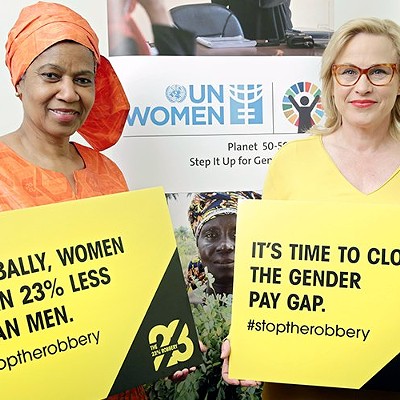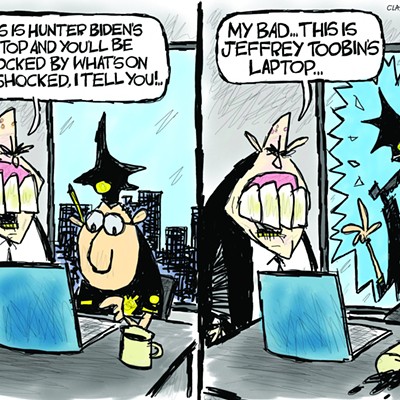Some accuse "angry man-hating feminists" across the United States of using family courts as tools for revenge on helpless, sad ex-husbands. Their claims: Women falsely accuse their husbands of physical, emotional or sexual abuse. They ruin men's lives with such charges, turning children against their fathers. These vicious females are out to get any one who stands in their way.
But then again, talk to the women characterized above--and another story emerges. They say fathers' rights groups, funded by the Bush administration, have used a recent surge of pro-family feelings to assert themselves in the courts. Domineering, power-hungry males turn the tables on the wives and children they've abused, often using the court system as a weapon in these new attacks. Women who've been battered physically can end up in jail. Women are threatened with the loss of their children if they don't cooperate with joint custody schemes for which they will get no child support. These arrangements put their children in the hands of a partner who's proven dangerous in the past.
Somewhere in the middle lies reality. And in the middle is exactly where the Tucson Weekly found itself several weeks ago; after the publication of "Men Who Get Hurt," (April 10), we were hit with a deluge of phone calls and letters from people all around the country, with people on both sides of the issue making the above claims.
Despite these varied viewpoints, it's clear: Taking these gender wars into the realm of family court--where domestic violence charges fly like Air Force jets over Iraq--isn't exactly a productive way of combating a very real problem.
"Domestic violence is such a difficult issue that it's hard to be objective," says Norma MacKenzie, executive director of the Tucson Centers for Women and Children. MacKenzie has spent 15 years with the organization, which offers a gamut of services from emergency shelter to legal advocacy to transitional housing for women and children--who TCWC staffers say comprise 90 percent or more of the victims of 10,000 serious domestic violence crimes investigated in Tucson last year.
"Everybody has a stake in their own personal opinion," MacKenzie says. "What we're dealing with here is human nature, that's where the quagmire starts."
Dottie's Story
SHE KNOWS ABOUT domestic abuse. Her daughter's biological father tried to murder her, Dottie says, when she was pregnant."He got six months probation and a fine," says Dottie (not her real name). "Two weeks later, he went after his parents with a knife. He was put in an institution. ... His parents got him out."
But these days, Dottie's more worried about a legal system in the United States that she says favors women over men--that ignores the plight of guys who just want to be good dads.
She's seen her husband, married twice before landing Dottie, torn apart by legal and emotional battles with his second wife.
"I'm not going to tell you my husband is perfect," Dottie says. "Far from it. They don't call him Grizzly Bear for nothing. But I can put him in his place, tell him to cut it out."
The Grizzly's first wife was "a doll," Dottie says. But after the two were divorced, the Grizzly met up with a childhood sweetheart who, according to Dottie, had a "fatal attraction" to the man. They married and had two kids. When the relationship went sour, this woman used the various empowering tools of family court to denigrate and abuse the Grizzly, to keep him from seeing his kids.
"She destroyed my husband financially," Dottie says. "She got custody, massive child support payments."
Dottie's husband hasn't seen his kids for three years. Now teenagers, the kids have been told by their mother that Dad doesn't love them, doesn't want them.
"They think he hates them," Dottie says. "When they used to have visitation, she would berate them for having a good time with their father. They would just be so depressed. Now we do not know where their emotional heads are at."
What's behind these out-of-control females? Feminist groups that are made up of women Dottie characterizes as bitter survivors of nasty divorces, some say. These women had wealthy husbands who retained custody of the kids. One organization Dottie cites by name is the National Alliance for Family Court Justice. One NAFCJ leader, Cindy Ross, is especially rabid, in Dottie's view.
"Ross and her organization believe that all second wives are terrible, horrible people and golddiggers who want to take their children from them. ... They want sole custody of the kids out of revenge, out of anger."
Dottie did not want her real name used in the story because she fears the women from the NAFCJ might want to seek revenge on her--by reporting fake sexual abuse charges to police and social workers.
"There are some very nasty women out there," Dottie says. "And if you don't agree with them, they will go after you."
Cindy's Story
ROSS, WHO LIVES IN Marin County, Calif., doesn't seem nearly as fierce as she's been made out to be. Her voice trembles as she speaks during a recent phone interview, and several times, she seems near tears. She agrees that there are some nasty people out there--and since she's been part of the NAFCJ, many of these critics send her e-mails."I've been accused of being a radical feminist Nazi," she says. "I get hate mail almost daily. There are some vicious people out there who don't like what I have to say."
But she's lived the problem, too. And she's seen women nearly destroyed by the courts.
She and others in the NAFCJ have spent the past several years following a money trail from the federal government to small groups of men who've banded together under the umbrella of fathers' rights, she says. The term "father's rights" sounds warm and fuzzy at first. But take a second look, and some of these groups do appear to be more interested in getting out of paying child support than in producing positive male role models.
Using federal funds made available as Temporary Assistance to Needy Families welfare grants or as funding from the U.S. Department of Health and Human Services, lawyers are hired and seminars held to disseminate legal advice on how to reduce female influence and credibility in family court. Some of these men have a history of physical and sexual abuse--yet they can receive money to pursue what the NAFCJ sees as a new line of attack against spouses who dare to leave them--or worse, who actually report physical or sexual abuse to themselves or their children.
Sound unlikely?
Well, it happened to Ross when she tried to leave her husband. She found that many of those involved in her husband's case had links to federally funded mens' rights organizations. And it's happened to others, she says. Ross tells of a friend named Sumi, who was born in Asia and married an American man.
Ross met Sumi when the woman arrived at a mothering support group with her 2-year-old son. Sumi was covered in bruises. Reticent at first, she began to open up and tell the others of being beaten for dropping an ice cube on the floor while mixing a drink for her husband. Ross took the woman to the sheriff's office and encouraged her to file a restraining order. Sumi was too scared at first. But finally, with the support of other women, she worked up the courage to leave her husband.
She found she was entitled to benefits like child support. Her husband, who was facing charges from the district attorney, could not hurt her. She began receiving counseling.
"She said, 'Why didn't I do this a long time ago?'" Ross recalls.
Then Sumi's husband filed for divorce. The case went to a family court that subscribed to new "fathers' rights initiatives," and things shifted. A restraining order was rescinded. Reports of abuse were "covered up" by the court, Ross says. New evaluations were ordered with new agencies. When Sumi took her son to a child abuse treatment facility ordered by the court, workers there said the results were inconclusive. Sumi's proof that her husband had repeatedly beaten her and her child were no longer factors in custody proceedings.
To make matters worse, Sumi was charged with making false police reports and custodial interference. She was threatened with jail and the loss of her son if she didn't agree to joint custody with the man who'd beaten her.
"(Authorities agreed) not to put her in jail as long as she made the commitment never to call police on her husband again," Ross says. "She's still involved in litigation."
Ross and others have witnessed the abusive behavior of Sumi's husband.
"He's a very crazy abusive person and even the DA said we have proof that he was beating her," Ross says. "But once it gets into family court, it's all switched around and she's in trouble."
Ross doesn't hate men. The vast majority of guys, Ross says, are fine during divorce proceedings. They want to stay involved in their children's lives and their ex-wives can see the value of this.
"Really responsible fathers don't need federal money to be encouraged to stay involved with their kids," Ross says. "You can see normal fathers out there any day at Little League games and church functions."
The NAFCJ's complaints are focused on a small percentage of cases, though, in which a domineering male hooks up with the federally funded fathers' rights groups that give him legal tools to further abuse his ex-wife.
"The majority of these moms were legitimately screwed," Ross says. "These are soccer moms, stay-at-home moms, primary caretakers--not radical bra-burners. ... There's an awful lot of money being earmarked for a whiney group of fathers trying to disguise their own past bad behavior. These fathers are recruited into groups that say, 'Oh, we're being denied our rights.'"
Norma's Medium
SHE'S HEARD ALL THE horror stories. Men hiding drugs in a woman's purse to make the woman look bad. Women making negative remarks about men so the women can retain custody."What we're missing here is that people are getting killed because of domestic violence," MacKenzie says, "and as a community we're not doing anything about it."
The Tucson Centers for Women and Children have two emergency shelters with 50 beds. The shelters, like others in the area, are always full. The TCWC staff is excited about a recent donation of $600,000 to build a new facility--The Lipsey Center. The center will be a focal point for an aggressive new domestic violence education and prevention program for women, children--and men. The large, open-to-the-public building signifies a "coming-out-of-the-woodwork" for the area's largest domestic violence help agency.
"If people start recognizing there's a problem, we will affect change," MacKenzie says. "But it needs the whole community behind it."
Sweeping accusations of gender bias don't advance this goal.
"We need to stop doing the he-said, she-said blame game," MacKenzie says. "Stop wasting time arguing who's to blame. I think we should spend more time finding a solution."












